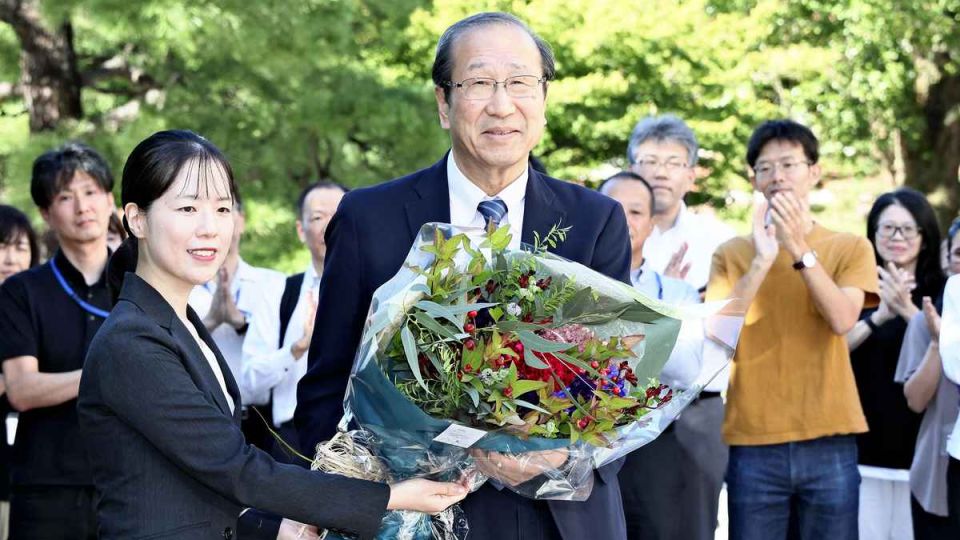October 10, 2025
KYOTO – Susumu Kitagawa, a distinguished professor at Kyoto University, was welcomed by about 100 people on arriving at the university’s Yoshida Campus in Sakyo Ward, Kyoto, on Thursday, having won the Nobel Prize in Chemistry the previous day.
“Thank you for all the attention from so many people,” said Kitagawa, 74.
Wearing a navy-blue tie and jacket, he received a bouquet from a university employee under clear autumn skies.
At a press conference later in the day, Kitagawa expressed his joy at winning the award. “When things are peaceful, various ideas come to my mind, but now, in a good way, things are no longer peaceful,” he said. “People used to treat me like an ordinary old man, but once I won the Nobel Prize, that suddenly changed.”
He added: “We scientists must take on new challenges and create better things. There is a mountain of work to be done.”
‘It must be fake’
At a press conference at the university on Wednesday after the Nobel Prize was announced, Kitagawa spoke energetically about the joys of researching metal-organic frameworks (MOFs) and expressed his gratitude to his family and colleagues.
“I have been blessed with a supportive environment,” he said.
When Kitagawa arrived at the venue where he was to speak at about 7:30 p.m., he looked somewhat tense. But when he said, “I’ve been allowed to pursue my research even after reaching retirement age,” his facial expression relaxed.
He was informed he was one of the winners for the chemistry prize at about 5:30 p.m., when he was alone in his university office. “I was finishing some work that had piled up, and the phone rang. Thinking it was a sales call, I was grumpy when I answered it, but it was from the chair of the Nobel Prize selection committee. I thought it must be fake,” he recalled.
Regarding his feelings on becoming a Nobel laureate, Kitagawa said, “I’m happy — not that my efforts were rewarded, but that chemistry will be better recognized by ordinary people thanks to my winning the prize.”
At the press conference, Kitagawa also recalled a bitter memory. In the late 1990s, he attended an academic forum in the United States and faced sharp criticism about MOFs. “I was challenged by people who questioned whether such a thing even existed,” he said. He was staying in a cramped room with no air conditioning and sometimes he could not tell whether he was crying or just sweating. But he maintained unwavering confidence in his theory.
His research promises a wide range of applications. “MOFs transform gases into useful substances,” he said. “Air is everywhere. It is invisible gold. The era of gases has arrived.”
When asked for his thoughts on the next generation of researchers, Kitagawa quoted microbiologist Louis Pasteur: “Chance favors only the prepared mind.”
“Just because you buy a lottery ticket doesn’t necessarily mean you will win,” Kitagawa said. “Opportunities are not something you pray for. They are something you build up yourself.”

